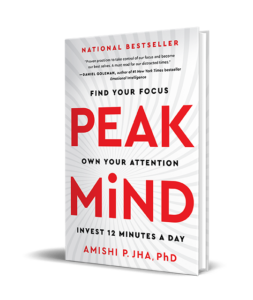Podcast: Play in new window | Download (Duration: 1:00:45 — 41.7MB)
Subscribe: Apple Podcasts | Spotify | Amazon Music
Through state-of-art science, learn how to reduce distractibility, rumination, and catastrophic thinking with 12-15 mins of targeted mindfulness training.
 Many of us struggle with hyper-vigilant minds that overwhelm our nervous system. We then often overcompensate by habitually tuning out, causing us to miss important information from our bodies and our relationships. This becomes especially true under high stress, which can wreak havoc on our ability to attend and be present where it matters most in our lives.
Many of us struggle with hyper-vigilant minds that overwhelm our nervous system. We then often overcompensate by habitually tuning out, causing us to miss important information from our bodies and our relationships. This becomes especially true under high stress, which can wreak havoc on our ability to attend and be present where it matters most in our lives.
In today's episode, co-host Dr. Ann Kelley talks with neuroscientist and author, Dr. Amishi Jha about her research findings on attention, concentrations and focus. Dr. Jha summarizes years of research findings on the neural bases of attention and the effects of mindfulness-based training programs on cognition, emotion, resilience, and performance. Through her work, she and her team have identified some of the most efficient and effective mindfulness skills that have will calm our minds, increase our focus and attention, and even improve our mood and sense of well-being. It literally changes the way our mind is wired.
“… everything can feel like a caution sign in the world when you're on high alert. That can lead to anxiety disorders, and is very common within PTSD. But most of the time, people don't think of that as an attentional challenge. And I'm saying it actually is – changing how we pay attention may soften the costs of a hypervigilant mind …”
Join our Therapist Uncensored online community as a TU Neuronerd and help support getting this content out to the world. For deeper dives into topics and extra episodes, join our online community for as little as $5 a month and get deep-dive content, ad-free feed, discounts on anything we produce, and unique study opportunities.
About Dr. Amishi Jha

Amishi Jha presenting at the PopTech convention (2010)
Dr. Amishi Jha, Ph.D. is a Director of Contemplative Neuroscience and Professor of Psychology at the University of Miami. Prior to her current post, she was an Assistant Professor at the Center for Cognitive Neuroscience at the University of Pennsylvania. She received her B.S in Biological Psychology from the University of Michigan, her Ph.D. in Psychology (Cognitive Neuroscience) from the University of California–Davis, and her post-doctoral training at the Brain Imaging and Analysis Center at Duke University in functional neuroimaging. With grants from the Department of Defense and several private foundations, she leads research on the neural bases of attention and the effects of mindfulness-based training programs on cognition, emotion, resilience, and performance in education, corporate, elite sports, first-responder, and military contexts.
Time Stamps
Resources

Amishi's Book – “Peak Mind”















